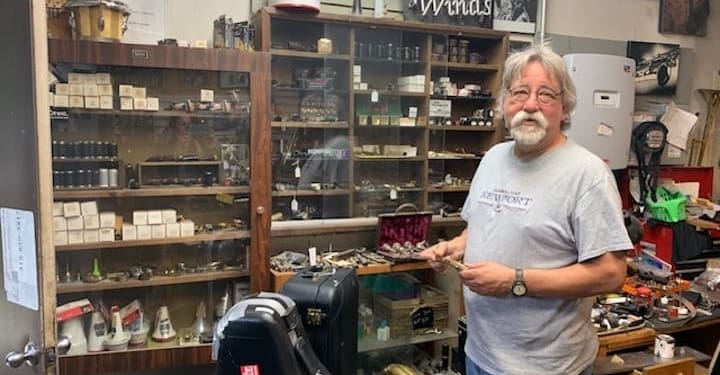DELMAR – Come September, the Capital District’s students, including those attending the Bethlehem Central School District, return to school, and hundreds of them will bring their musical instruments. Some instruments spent their summer vacation in a closet, left out on a bed, or worse. Those instruments must be ready to play, but only a handful of instrument repair shops remain locally, especially for brass and reed instruments.
Who you gonna call?
Emile Catricala, of course.
Catricala has been repairing and refurbishing the Capital District’s brass and wind instruments since 1979. At 65, he still loves repairing instruments, despite the grueling schedule – seven days a week. At this time of year, he fixes so many instruments he sorts his house, where he has his Colonie repair shop, into instrument rooms, like family room for tubas.
He came by instrument repair naturally, having grown up in a family that for generations birthed teachers, performers and instrument makers.
“As a family, all we talked about was music, food and fishing. We never talked about sports,” he quipped. “It was more like, did you see my new trumpet?”
Rather than a traditional college, he opted for a one-year instrument repair program in Wisconsin, which was more like an apprenticeship. For 12 months, with only one day off for Christmas, he learned how to repair and refurbish instruments. He polished 500 sousaphones his first day.
Catricala said that while no one would hire him for a wedding, he can play the myriad brass and wind instruments he repairs. Of the thousands of instruments he has repaired, he sees flutes and clarinets most often, because they are popular, and the pads and key work are delicate.
“They go out of adjustment, particularly with humidity changes or being bopped around a school room,” he noted. “There is always something that needs to be done for them.”
According to JoEllen Gardner, with Bethlehem Central School District communications, every year approximately 425-475 Bethlehem students participate in band (brass, reed and percussion) at the elementary, middle and high school levels combined. Catricala fixes instruments not only for students, but for college, high and middle school music departments, teachers, and area jazz bands. Business comes to him by word of mouth.
Stepping into the repair studio feels like entering a wizard’s office at Hogwarts. The studio is a jumble of instruments, parts and tools. Catricala has memorized every part of every instrument.
“I can tell the difference between a Selmer and a Yamaha part when you put it in my hand,” he said.
He gets parts for brand names like Buffet and Selmer through catalogs and parts marketplaces. Many parts come from other broken instruments. Over the years, he has also bought boxes of parts from stores that were closing.
“I have shoeboxes stuffed full of pieces of parts,” he said.
He recounted how a professional trumpet player, who arrived at his shop with an emergency, found a part.
“As I was soldering something on his trumpet he said he had gotten a Cahn Constellation 1950 trumpet, but he can’t play it because he needed a valve guide,” he remembered. “He had searched all over NYC but couldn’t find one. I went over to a box and pulled one out for him.”
Another time, Catricala was doing a repair for a professional trombonist who said he had been looking forever for a particular mouthpiece and hadn’t seen one like it in years. “I had it,” he said as though it were the most obvious thing in the world.
Sometimes he has to report that the “patient” is terminal. “But they usually know when they bring it in,” Catricala said. “If you buy a $99 clarinet and leave it lying on the bed and then sit on it and it breaks in half, it’s just not reparable.”
He works out each repair on a case by case basis without using YouTube or reference books. Instead he figures it out for himself.
“You just have to think about things for a while before you jump into it,” he explained.
That willingness to think things through has led him to adaptive repairs for individuals with disabilities. For a clarinetist who lost a finger tip, he unsoldered the middle ring key, made up and added a pad, post and a spring. For a trumpet player with one arm, he made a brace so he could put the strap around his chest and hook the trumpet on it. For a French horn player missing a thumb, he constructed the fourth of the four French horn levers so the musician could work it with the palm of her hand. Years later, that individual told Catricala that she still uses his French horn. He believes everyone who wants to should be able to play an instrument.
As part of that ethos, Catricala intentionally keeps his prices “reasonable” because he thinks “no one should not be able to play an instrument because they can’t afford it.”
When asked why he thought so few instrument repairmen are left, Catricala opined that there are so many other careers that sound more exciting to choose from now.
But instrument repair will always be needed. Gardner reported that the Bethlehem Music department is not aware of any student who has expressed an interest in going into instrument repair.
Catricala is one kid who had those qualities, and his sheer joy in his chosen profession is ever present. His face lit up when talking about why he has been repairing instruments for over 40 years.
“When a 9-year-old is going to start taking lessons and maybe it’s her mom’s old flute and she comes back and sees it all polished and her eyes open wide with excitement, that’s why I’ll never retire.”



